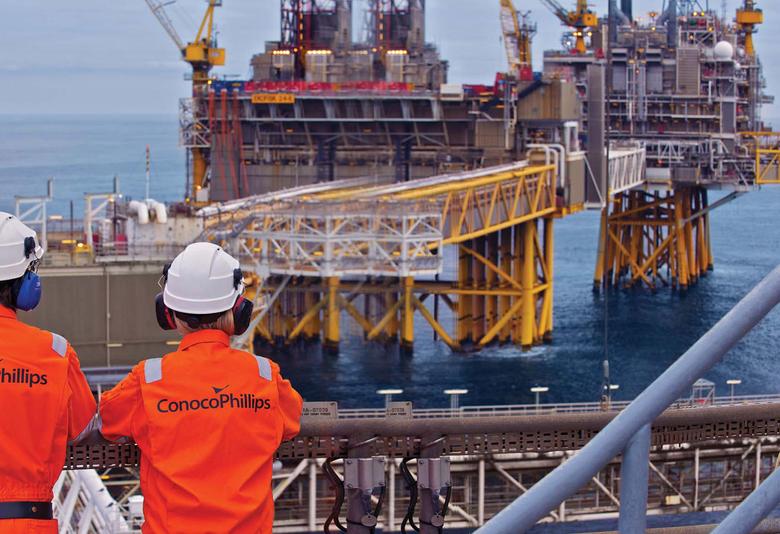
CONOCO: TO REACT QUICKLY

ConocoPhillips will emphasize North American unconventional oil and gas projects amid depressed oil and gas prices because technology is still driving costs down and improving their economics, Chief Executive Officer Ryan M. Lance said.
"I can't rely on picking a commodity price to set my budget and make my plans. But I know what wins in a low-price environment, which are low cost-of-supply investments," he said during an appearance at the Council for Foreign Relations in New York.
"You also need a low cost structure and a strong balance sheet for a strong credit rating with good access to the debt markets," Lance said. "A company like ours also needs to be able to react quickly to developments."
The Houston independent announced a $7.7-billion capital budget for 2016, down 55% compared with 2014's spending plan and 25% less than what it expects to spend in 2015. Like other companies that work exclusively upstream, ConocoPhillips has had to react to a 60% plunge in its revenue after what Lance described as "a hyperinflation increase" following the 2008-09 recession.
"I don't necessarily know where prices will go in the next 2-3 years, but I know what kind of portfolio a company like ours needs," he said. "That involves being able to invest in low-cost-of-supply investments to manage through a period of uncertainty. We're trying to have that kind of portfolio to survive in such a volatile environment."
ConocoPhillips is looking at North American unconventional oil and gas projects fitting that description, Lance said. It has largely withdrawn from offshore development, although he thinks it will be needed within the next 20 years.
'In very early innings'
"We just see more competitive opportunities with our North American unconventional position, where we've seen what technology can do," Lance said. "I'm convinced we're still in the very early innings there. When we apply that, we see a lot of running room in our space. Remember, 90% of the wells drilled in America are drilled by independent producers like ConocoPhillips."
Lance said he expects to see more distress sales if $35-40/bbl prices persist through 2016. "We're deferring investments but trying to sow seeds for the next recovery when commodity prices start to improve. Most people see that possibly occurring at the end of next year," he said.
Meantime, he said he is reviewing how much deflation the company is capturing in lower service and other costs. "We're trying to attack the entire supply chain and reduce costs," Lance said.
Repealing the 1975 ban on exporting US-produced crude oil would be a significant help since it creates a price differential because new US tight oil production is largely stranded, he said. "If we continue the growth and development of our unconventional oil resources, we'll be faced with three choices: expanding refineries, shutting in production, or exporting crude," Lance said.
"Historically, the quality of US crude was above global crude in the Brent market, and we used to sell it at a premium," he said. "Today, US crude trades about $2/bbl below global prices. The problem is that when refiners take their plants into turnaround for maintenance, we've seen that blow out to as much as $20/bbl, which is a serious problem. That's why the crude export ban needs to be repealed."
Little near-term impact
Lance spoke the same day House and Senate Appropriations Committee leaders released a 2016 omnibus appropriations bill which included a provision to repeal the crude export ban (OGJ Online, Dec. 16, 2015). "I suspect that the way the market is oversupplied, there would be little impact in the near term," he told his CFR audience.
"In the next 3-5 years, we could send 500,000-2 million b/d of exports, which would level out some of the global market's volatility," he said. "It won't be a big number, but it will help us maintain investments and survive artificial price blowouts when refineries go into turnaround."
US crude exports would be better-suited for simple refineries in South America and Europe than in Asia, where transportation costs would be higher, Lance said. "We've actually exported some of our Alaskan crude to Korean refineries because production there is not subject to the export ban," he said.
Asked if climate-change policies could affect global demand growth, Lance said that ConocoPhillips looks at several different scenarios. "This past October, the board looked at a hyper-regulation scenario of what would happen under a 2°C. goal," he said. "While we don't know where prices are going, it's important to test your strategy against these signposts. More important, you need to know the no-regrets decisions you make under any scenario."
ConocoPhillips works in countries that already have put a price on carbon emissions, and was one of the few US producers to support cap-and-trade legislation US Reps. Henry A. Waxman (D-Calif.) and Edward J. Markey (D-Mass.) developed which the House passed 10 years ago, Lance said. "We believe in market-based mechanisms, so we'd like the government to not pick winners and losers and be neutral."
Lance said, "The question is how you get affordable energy to the ends of the earth. People in some countries are burning wood. Parts of China are badly polluted. We'll still need fossil fuels. There is no pathway I've seen by anybody that renewables will get us there. It takes at least a century to change an energy system. Energy needs are growing. So is the developing world. Those countries need to have access to affordable energy."
-----
More:

